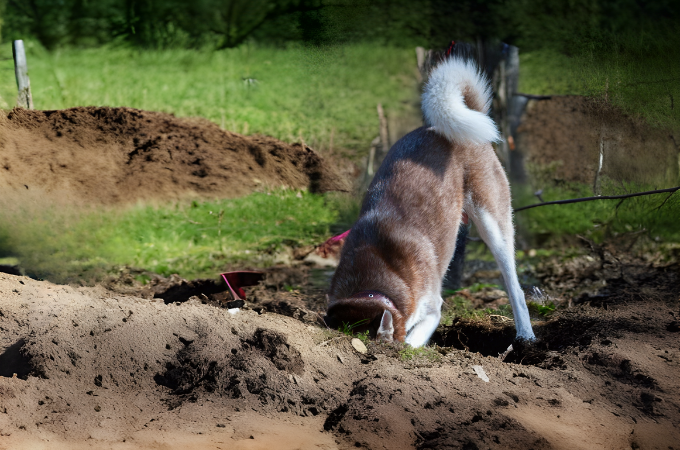
Dimpho’s cry was haunting against the soft song of the whistling wind. I have known her since I was three years old. She used to force feed me motogo wa ting[1] while we sat under the giant Benjamin tree that still stands in the middle of the moraka.[2] When I was particularly stubborn, she would break off a stick from one of the lower branches and place it next to her, unmoved by my protests. I would go silent at once. She was, after all, the same woman who could grab a hot, white coal from the fire and throw it aside to make room for another pot. The woman who stood before me – long arms wrapped tightly around her body as if she would unravel if she let go – was a shadow of the Dimpho I knew. It was hard to believe we were only seven years apart in age.
She gazed at me. I felt like I was staring at her naked body. “Lele, ngwanake o kae[3]? My child who brings you moretlwa[4] when you are visiting us? Hmm? O sule. O sule!”[5] she choked through sobs that tightened my throat. I reached for her. She took one unsteady step towards my outstretched hand. Then a second. Then a third. Then suddenly, her legs could not hold her up any longer, and she crumbled. Kago, her brother, caught her before she could touch the ground and lowered her gently down. He is a tall, wiry man with spindly, greying whiskers and a thick carpet of coily hair covering his head. He hugged Dimpho tightly, soothing her by rubbing circles on her back. Her child had been missing for two full days now.
“Go tla siama, ngwanaka,”[6] I heard him whisper in his warm, gruff voice. “Sidilega,[7] go tla siama.” He did not try to assuage her fears – to lie. The absence of that reassurance was not missed. We all knew what had happened. The wild dogs – matlhalerwa – had taken her child. It was commonplace. So, Kago held her and soothed her. Her tiny hands dwarfed in his. As he peeled them open, Dimpho relinquished a small red and white Adidas sneaker. Kago had found it by the roadside that morning while searching for the child. It was what had triggered her. Before I could open my mouth to offer a word, something, anything, Dimpho snatched it back from him as her lament started anew.
“Ngwanake o kae…” she whispered through jumpy sobs, eyes glinting with tears. As she spoke, she glanced at the small crowd that had begun to form, her eyes pleading for answers. Some were workers at the moraka – like her – but others were visiting from neighbouring ones as they often did when something like this happened: to share the burden of sorrow. There were a few young women, a teenage boy, and a young couple with a little boy in dirty shorts who began to cry at the sight of Dimpho. His nose was crusty with dried mucus. “Ngwanake o kae?” Dimpho shrieked, “Ngwanake o kae?” My body stiffened as her gaze swung in Theo’s[8] direction.
Theo had been standing beside me the whole time and watching in silence. He tensed. I knew he was uncomfortable. He didn’t know how to deal with Dimpho’s notorious, burning gaze. I felt a strong need to say something, anything, but I knew that nothing would be enough. As if sensing my inner battle, Theo turned to me. We had not yet revealed our newfound relationship to anyone since my arrival the night before, so there was not much he could do to comfort me in front of all these people. Though there was no need, for his presence comforted me. Just as I was when Ntatemogolo’s[9] truck met its end in the middle of the road last night.
I was already two hours into my journey, having left my flat in Gaborone after a call from Kago, telling me the news about Dimpho. The car made a grating, grinding noise and that was that. I was not as upset when Ntatemogolo himself died. A raging alcoholic on his best day, the old reptile was not a man to be mourned. So, at seven-thirty at night in the middle of July, I was not ashamed to think of the truck as more important than he ever was. My Mazda Demio would have never made it had I chosen to use it. The last 500-metre stretch of road leading to the moraka is made of silty, pink sand. I used to play in it when I visited the moraka as a child, making sand angels because I didn’t have snow here like the children on television did. When it was damp after the rain, my cousins and I would mould it into our dream houses. When the rain came back again to destroy them, we wouldn’t sing it away. We would ask it to make us grow: pula, pula nkgodise, ke tla gola leng![10]
Cursing under my breath, I peered over the huge steering wheel to try and see past the dimming glow of my headlights. Before I could enjoy the comfort of their light, there was a soft, electric hiss. The lights flickered, and that was that. All I could see was darkness all around. Solid like a living entity. An unsteady breath trickled out of me. Without the ravenous roar of the engine, it was loud. Other sounds that had been lurking in wait began to make themselves known; chittering insects, the hoot of an owl and the yelping hyee-hyee of wild dogs in the distance. Wild dogs frequented the shrub forest around the moraka. They were known for attacking small children who would walk home from boarding school during the school holidays, too eager to await transport on their way home. I shuddered. Though I knew that I was safe enveloped in a great, hulking beast of metal, my brain did not believe me.
***
When I was little, I used to visit Ntatemogolo often. He lived close to the moraka so he could keep an eye on things. Once he sent me to the storeroom to fetch some dried, salted meat for supper. The store-room – which used to be a semausu[11] in more affluent times – was on the other side of the homestead. It was night-time and he knew that I was afraid of the dark. But, in his words, those kinds of fears were for babies and not ten-year-olds like me. Also, he was a vindictive little man with a penchant for practical jokes. I remembered begging him to send Theo instead, our neighbour’s annoying son who always loitered in our yard during mealtimes. But Ntatemogolo was as adamant as he was cruel. With a stern look and a warning to do it now, he retreated to the lapa,[12] going for his evening smoke. I prayed that it would choke him to death.
Trembling, I left the main house and headed for the storehouse, convinced I would meet something sinister in the dark. Just as I reached the entrance of the cement-block structure, a sharp, hyee-hyee! exploded from a gathering of bougainvillaeas that looked like nightmares in the dark. My heart vaulted into my throat. I screamed and felt a warm, wet sensation travel down my pant leg. As I stepped back, trying to escape, I stumbled over something. Theo, laughing so hard that he had to clutch at his sides, appeared from behind the bougainvillaeas. Behind him, my grandfather loomed, a sharp grin splitting open his lined face. I lay in the dirt – barely able to see through tears of rage and shame – in soiled pants that I later had to hand-wash before I could go to bed.
***
That fear felt fresh the night the truck broke down. But I knew that I had to face it. I always kept a spare battery in the truck bed for such emergencies. All I had to do was get out, replace the battery and ignore the sound of the simpering, snickering beasts that used to haunt my nightmares as a child. No worries. I counted down from ten, curled my fingers around the door handle, pulled back and froze as I began to see two tiny beads of blinding white coming from the direction of the moraka. Headlights. As they drew nearer, the shock of light momentarily blinded me and then cool relief. Before it could fully register, I had flung the door open and jumped out. I then proceeded to wave my arms up and down, signalling a stop as if I weren’t the only thing visible for several kilometres. The car came to a halt close to me. The door of the glossy, white Land Cruiser popped open and a tall, hulking figure emerged from within.
It was then that I realised my actions. I couldn’t believe how naive I was. A foolish part of me was excited to be rescued but a larger part realised that wild dogs were not the only devils in the night. The figure began to walk towards me, and all I could do was stand there, frozen in that finicky fight or flight moment. The figure stopped. “Lele?” it said. The voice was deep, gentle and grounding. As the figure took another step forward, the light reflecting off my bonnet illuminated the smiling face of my childhood nemesis in adult form. “Theo?” He laughed, a rich rumbling sound that still bore the remnants of childish glee. How little he had changed. I found myself laughing along, joy mingling with refreshing relief.
I was propelled towards him, and he received me in a tight embrace. “Oh my god,” he said, his voice soft. The words escaped him as if he had not intended for them to. “Oh my god,” he repeated. The moment was shattered by a sudden, excited yelp. For a horrifying second, the image of a blood-thirsty wild dog popped up – unbridled – in my mind. I stiffened in Theo’s arms but was soon reassured when I saw a tiny, brown and white ball of energy at his feet. I looked down at it as Theo released me. He bent down to pick up the little creature, chuckling at its enthusiasm. It wanted nothing more than to escape from his clutches and lick my face. I laughed despite my earlier reservations. “This is Sparky,” he said, his eyes still fixed on me. I reached out tentatively to touch Sparky, only to be rewarded by a warm, wet tongue. Before I could react, Theo reached out to grasp my hand in his. The reassuring touch of his skin filled me with a familiar warmth.
“I can’t believe I’m looking at you,” he said after a beat of silence. “I just can’t believe it.” I felt the same. He explained to me that my uncle – who had inherited the moraka upon Ntatemogolo’s passing – had asked him to keep an eye on the new calves for a few months while he was away. To put his fresh veterinary degree ‘to good use’, as he put it. Throughout his explanation, the shock of seeing him lingered. The last time we had seen each other he was fifteen and leaving for boarding school in Francistown – hundreds of kilometres away. I was eleven and only starting to realise that my hatred towards him was something different.
The fact that we reunited on the same night I came to the moraka for Dimpho was bitter-sweet. She was the one who had brought me comfort as I had tried to understand the burning sensation in my chest when I watched a younger Theo walk away from me. Now I had to do the same for her.
Snapping back to the present, I went to sit in the sand beside Dimpho, Kago remaining resolutely on the other. She lay her head on my shoulder and cried until she fell asleep. Kago carried her to her hut. Dimpho refused to attend her child’s funeral. We held it three days later with her brother as the family representative. I offered one of my goats to be slaughtered, to feed the mourners, who had come to pay their respects. Days that turned into weeks passed by, and life at the moraka went back to normal. I could still remember the sound of Dimpho crying but the sting of it was dull in the haze of my domestic bliss.
That day seemed like a lifetime ago. A lifetime of warm embraces, gentle touches, and soft declarations of love. Yet it had only been three weeks. I spent every moment I could with Theo. That meant staying with him in the guest house. It was a modest, thatched house with running water but no electricity. I adored it. It carried the memories of my beloved Nkuku.[13] She was the one who had asked for the guest house to be built so that she and Ntatemogolo would have a place to stay when they visited, instead of rushing back home before nightfall. Unlike with my grandfather, she I had properly mourned.
I was taking down the last of the laundry from the washing line under the lazy mid-afternoon sun one day, when I caught a fit of movement from the corner of my eye. Sparky was digging in the forbidden spot by the perimeter fence again. He was obsessed with it and was always getting in trouble with Theo for it. One of the poles was even loose because of him. I sucked my teeth in irritation. Gathering my wrapper up to keep it away from the dirt, I rushed over to him. A vehement “Voetsek!”[14] flew like a hot bullet from my mouth. I picked up a stick to threaten him with, but Sparky would not be swayed. My irritation doubled, “Sparky, off! Off!” He yelped back in response as I drew closer, curiosity soothing away my irritation at his whiny noises. Sparky is an over-eager pain in the neck, but he is not a stubborn animal. “Sparky, what is it?” The tiny dog responded with a distressed, keening noise and continued to dig in earnest. This time, I let him.
His little paws clawed swift and vigorous at the dirt, sending bits of sandy debris flying behind him. The white part of his fur began to turn brown. My curiosity peaked. I had heard of moraka dogs finding beautiful antiques buried in the ground under decades of earth and thought I might be one of the lucky ones. Sparky was on a mission.
A few more frantic scratches.
A rough scraping noise.
A yelp of pure elation.
Sparky gave one final, gratifying bark and began to nose enthusiastically at the dirt. I moved closer to the freshly dug hole and peered down into it. My mind clouded with confusion at first. Then, with a massive swooping sensation low in my belly, realisation bloomed in my mind.
Everything melted away.
The garden, the sunlight, Sparky’s noises.
What was left behind was this one thing.
This small, red and white Adidas sneaker.
It was at the end of what appeared to be a human leg with folds of leathery skin hanging off it.
A wave of crippling dread rushed through my body. I felt light-headed. My knees buckled and I was on the ground. I could not remember falling and could not remember picking up the shoe. Yet there I was in the dirt, my wrapper soiled and crumpled and still clutched in my hand. Somewhere in the distance, a call echoed. I raised my eyes, trance-like. On the horizon – a halo of sunlight fuzzy around him – stood Theo. I stood up as he drew closer to me. Although he was far from me, I had no difficulty in making out all the emotions that danced across his face.
Determination.
Confusion.
Shock.
Fear.
One after the other, the cogs in my head were triggered into motion, and as the last of them slid into place, I understood. A bout of nausea overcame me. The jarring force of it made my knees buckle, and I was on the ground again. There – on all fours like a wild animal – I emptied my stomach’s contents with great, gasping groans. When I was done, I looked up to see Theo looming over me with anxious eyes. “Lele,” my name fell from his lips like an intimate prayer. “What did you find?”
My stomach roiled again, “You know what I found.” Theo bent down to help me to my feet. He said so many things, but he was speaking too fast for me to take it all in. I only caught a few words. So dark… going so fast… too fast… I thought it was… I thought it was… just a wild dog… please, Lele… please, Lele… please, Lele… it was an accident…
His hands tightened around me, as he buried his face in my neck. I shuddered at the feel of his hands on my body. These hands had scribed words of devotion on my skin. These hands had been dirtied by the blood of Dimpho’s seven-year-old child. I felt numb. “Please, Lele…” he continued to mutter. I shut my eyes tight and opened my mouth – to scream, to sob, to sigh. I do not even know what my intention was because nothing came out except the threat of more vomit. After a few moments, a few words made a valiant escape, “It’s okay… it’s okay,” I said. My voice was only a whisper, but steady. Theo’s only response was a frantic nodding of his head and a few more shaking, heaving breaths.
My mourning felt hollow and ugly and tainted. But I allowed the tears to flow as penitence, squeezing my eyes shut against the image of Dimpho’s anguished face with eyes that had burned into me. Into Theo. She knew. She had always known. I would not be the one to burden her with more knowing.
[1] Fermented sorghum porridge.
[2] Cattle post.
[3] Where is my child?
[4] Wild berries.
[5] He/she is dead. Setswana pronouns are gender-neutral.
[6] It will be well, my child.
[7] Be comforted.
[8] Not to be confused with the English version. The ‘Th’ is with aspiration.
[9] Grandfather.
[10] Rain, rain make me grow, when will I grow!
[11] Tuck-shop.
[12] A small outdoor structure like a courtyard.
[13] Grandmother.
[14] A vulgar word for ‘go away’. Commonly used for dogs.
Photo by Sabbra Cadabra on Unsplash



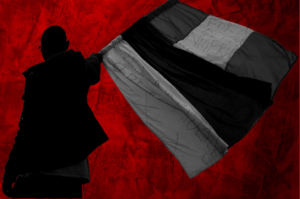
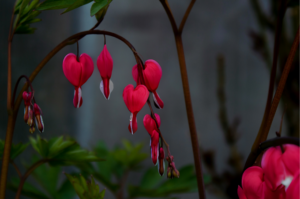
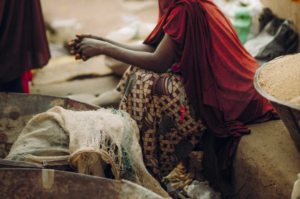
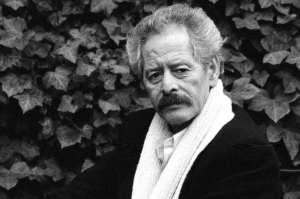
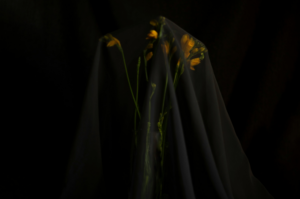


Abdullahi Ali February 03, 2024 11:21
The winning story is well detailed. Thank you for the opportunity reading it on Brittle Paper. And more Glory to Keabetswe Molotsi.